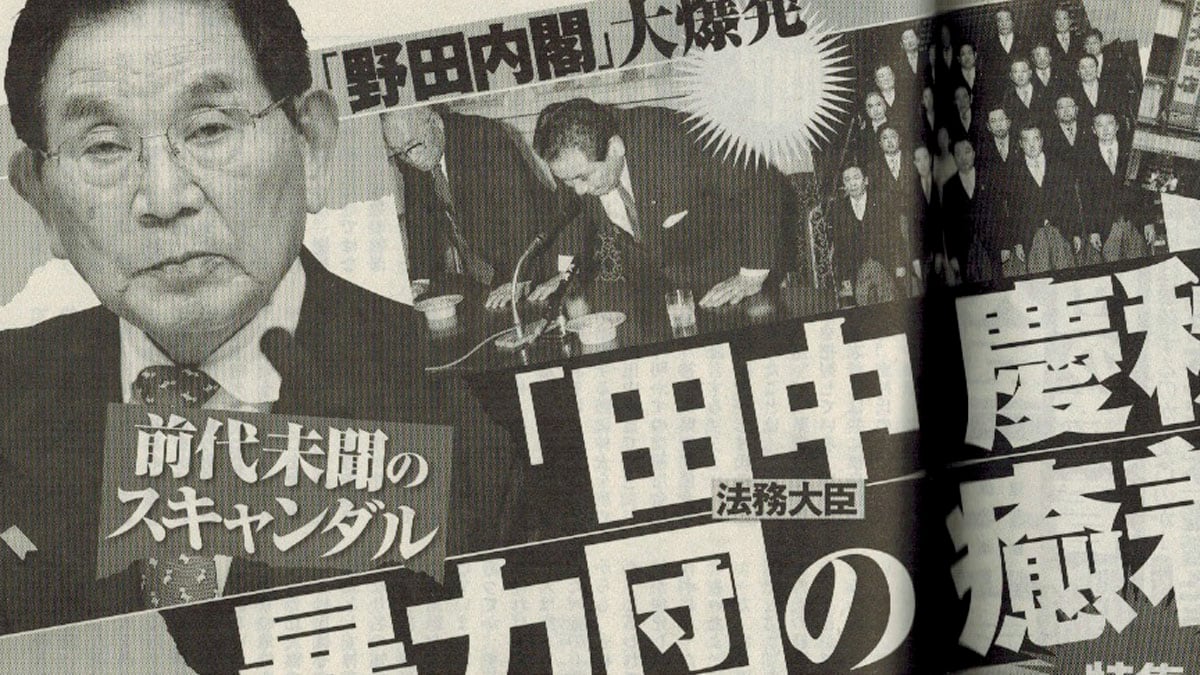It seems like Japanese politicians just can’t get enough of the yakuza.

It was reported last week that the newly appointed Minister of Justice Keishu Tanaka (Democratic Party of Japan) had strong ties to the Japanese mafia. This Thursday, Japan’s respected weekly news magazine, Shukan Bunshun, ran an article on how Japan’s Minister of Finance Koriki Jojima, was supported by a yakuza front company during his election campaign. Minister Tanaka is expected to resign Friday (Japan time). If he does, he’ll be the second Democratic Party of Japan (DPJ) appointed cabinet minister since 2009 to resign after exposure of yakuza ties. Not a good thing for the DPJ, which came to power as “the clean party.”
Last Thursday the weekly magazine Shukan Shincho was the first to write that Minister Tanaka had long running ties to the Inagawa-kai. The Inagawa-kai, Japan’s third-largest crime group, was founded as Inagawa-Kogyo circa 1948 and their current headquarters are across the street from the Ritz Carlton Tokyo; they have 10,000 members. According to the police, since 2007 the group has been under the umbrella of the Yamaguchi-gumi, the largest yakuza group in the country, with 39,000 members. Kazuo Uchibori, the leader of the Inagawa-kai, was arrested this month on money-laundering charges. The Tokyo Prosecutor’s Office (TPO) has not yet decided whether to prosecute him. The TPO is also part of the Ministry of Justice, headed by Mr. Tanaka.
The Shincho article alleges Tanaka has long relied on the support of the Inagawa-kai in his political and business dealings and had participated in many Inagawa-kai events—including serving as a matchmaker (仲人, nakoudo) at the wedding of an underboss. The piece also states that the Inagawa-kai suppressed scandalous rumors about Tanaka’s life, involving a tawdry love affair. The underboss responsible for handling the negative PR matters allegedly told would-be extortionists, “Tanaka was the matchmaker at my wedding. Save my face—forgive and forget about it.”
The Daily Beast spoke with Inagawa-kai members and police officers from Kanagawa Prefecture who confirmed that Tanaka did indeed have strong ties to the Inagawa-kai, until at least two years ago.
Tanaka has admitted to attending Inagawa-kai events in the past, including the wedding, but has denied the rest of the allegations.
Sen. Shoji Nishida who has investigated and written about the ties of some DPJ members to the mob in WILL magazine (November 2011) says, “Tanaka is the 4th DPJ-coalition-appointed minister with yakuza ties. I wonder if they even screen the people they put in cabinet positions. The minister of Justice is supposed to be the watchdog of the law, not a matchmaker for the yakuza. Putting a yakuza associate in charge of Japan’s criminal-justice system ... that’s outrageous. Now I can understand why the Yamaguchi-gumi endorsed their party.”
While it may sound like Senator Nishida is joking about a yakuza group endorsing one political party—he’s not. The DPJ and its ruling coalition partners have been officially supported by the Yamaguchi-gumi, since the summer of 2007. The daily newspaper Yukan Fuji (夕刊フジ) ran a scoop about the political support as a cover story on Oct. 12, 2007. The headline was: “Yamaguchi-gumi Endorses Democratic Party of Japan.” According to that article and other sources, in summer of 2007, the Yamaguchi-gumi and the Inagawa-kai instructed their members to offer their full support to the DPJ and its coalition partners, just prior to the Upper House elections that year. Traditionally, the yakuza have supplied the ruling party with votes, financial aid, and squelching scandal services.
It should be pointed out that the DPJ coalition has not officially endorsed any organized crime group in Japan. It may very well be a unilateral relationship. The DPJ has consistently opposed passing a Criminal Conspiracy Law, legislation that would be fatal to Japan’s semi-legitimate organized-crime groups. It would make sense for the mob to support their own interests.
It was not that unusual for Japanese politicians to have yakuza ties in the past. In the good old days, yakuza themselves even served as ministers of the Japanese government. The grandfather of ex-prime minister Junichiro Koizumi (Liberal Democratic Party), Matajiro Koizumi, was a member of a yakuza group later absorbed into the Inagawa-kai. During his term serving as the minister of general affairs (1929–1931), due to his ornate body art, Matajiro Koizumi was fondly known as “Irezumi Daijin” (入れ墨大臣) or “the tattooed minister.”
Minister Tanaka has no tattoos, but public outcry over his involvement with the Inagawa-kai has put him in a pickle. This Thursday, Shukan Shincho followed up last week’s article with a new one alleging more yakuza ties between Tanaka and his family. Things look so bad for Tanaka that he failed to show up at the scheduled budget committee hearing Thursday. NHK News reported this morning in Japan that he was expected to resign soon.
Koriki Jojima, the minister of finance, is denying any substantial ties with the Inagawa-kai front company, Taiyokaihatsu, which allegedly helped him win his last election in 2009. He did not expressly deny knowing the yakuza associate, Haruji Shikato, who runs the company.
Meanwhile, according to Chuo Journal and other reports, Seiji Maehara, the head of the Democratic Party of Japan from 2005-2006 is being investigated for violations of the Political Funds Control Act, relating to donations he received from a Yamaguchi-gumi front company, Media 21. Maehara resigned as minister of foreign affairs after his relationship to Jun Shinohara, the Yamaguchi-gumi boss who founded Media 21, became heavily scrutinized.
It is increasingly likely that at least Keishu Tanaka will be forced to resign from office due to his past role as a “yakuza matchmaker.” His resignation is unlikely to be the end of—what so far—has been a really great relationship for the Japanese political parties and the underworld—a match made in heaven. For Japan’s political parties the yakuza are a necessary evil. When you need to get out the vote, squelch possible political scandals—or create them, nobody does the job quite as well as Japan’s mafia.






